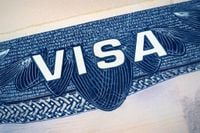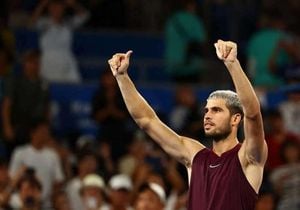As the countdown to the 2026 FIFA World Cup begins, the United States is bracing for an unprecedented surge in visa applications from soccer fans around the globe. In response, the U.S. State Department announced this week that it will deploy hundreds of additional consular staff to embassies and consulates worldwide, aiming to process the tidal wave of requests from those eager to attend matches spread across the U.S., Canada, and Mexico.
The move, revealed on October 3, 2025, comes just as tickets for the highly anticipated tournament went on sale, igniting a rush of travel planning among fans. According to the Associated Press, the department will send “hundreds of staff to designated countries” in the coming months to conduct visa interviews for applicants who lack existing U.S. visas. However, the exact number of officers and the specific countries where they’ll be posted remain undecided, as the final 48-team lineup for the World Cup has yet to be announced.
“Certain countries are going to be very, very easy and other countries are going to be, obviously a little bit more difficult,” President Trump told reporters from the Oval Office last month, directly addressing the uneven landscape that international fans now face. Secretary of Homeland Security Kristi Noem, standing beside the president, assured, “Visa applicants will be thoroughly vetted, but they’ll be welcomed to this country. It’ll happen quickly, and we’re excited for them to come.”
For fans hailing from countries covered under the Visa Waiver Program—many in Europe and Asia—the process should be relatively straightforward. These travelers are unlikely to require in-person interviews, provided they meet all other requirements. But for those from nations outside the program or without valid tourist or business visas, the road is more challenging. They must apply for a visa, a process that now involves mandatory in-person interviews and enhanced security checks, including reviews of social media activity and public statements.
The State Department has emphasized its readiness: “We are prepared to meet the demand while maintaining rigorous vetting requirements.” Officials noted that in nearly 80% of countries that have qualified, or could qualify, for the World Cup, interview appointments can be scheduled within two months or less. Still, they urged applicants to start the process as early as possible, warning that average waiting times for a B-1/B-2 (tourist/business) visa interview have stretched to 169 days in many countries due to soaring demand.
This surge in applications coincides with a period of heightened scrutiny and tougher immigration policies under the Trump administration. The administration has intensified visa screening, subjecting applicants to social media checks and close examination of public statements. According to Nexstar Media, the State Department has implemented a “catch and revoke” policy, canceling visas of foreign nationals who appear to support Hamas or other U.S.-designated terrorist groups. In August alone, the department reportedly revoked 6,000 student visas for violations of U.S. law or overstays.
Travelers from non-Visa Waiver Program countries now face a $250 “Visa Integrity Fee” on top of existing charges—a burden that falls especially hard on fans from Latin America, India, Brazil, and other non-waiver nations. Another new measure under consideration is a refundable bond of up to $15,000 for selected visitors, designed to discourage visa overstays.
Further complicating matters, the administration invoked Proclamation 10949 in June 2025, which restricts entry from 12 named countries on national security grounds. This could block or delay travel from these nations even if fans are able to secure visas. The rollback or suspension of the Interview Waiver Program (IWP) also poses challenges; under Trump-era changes, fewer applicants now qualify to skip the in-person interview, even in cases where that was previously possible.
Despite these hurdles, the State Department has tried to reassure would-be travelers. Officials have confirmed that visa and passport services will continue to operate despite the U.S. government shutdown that began on October 1, 2025. “Fans should begin the visa application process now,” the department advised, highlighting that in about 80% of qualified or potentially qualifying countries, interview appointments can be scheduled within two months or less.
Transportation Secretary Sean Duffy added a note of caution for visitors: “Don’t overstay your visa. Don’t stay too long.” The administration’s message is clear—while the U.S. is eager to welcome the world for the World Cup, it is equally determined to enforce its immigration laws rigorously.
For many, the process is daunting. In some countries, obtaining an interview slot for a U.S. visa—a prerequisite for World Cup travel—already takes many months. The average 169-day wait time for a visa interview, as reported by ETNRI, underscores the scale of the challenge. As a result, officials have urged applicants to act quickly, emphasizing that early preparation is crucial to avoid disappointment.
Against this backdrop, the U.S. has seen a noticeable drop in international tourism, a trend attributed by Nexstar Media to the Trump administration’s return to the White House, its antagonism toward other countries, punishing tariff policies, and a crackdown on immigration. The new World Cup visa measures, while designed to facilitate fan attendance, reflect this broader context of stricter border controls and heightened security concerns.
Not everyone is convinced that the increased staffing will be enough. Critics argue that the combination of new fees, possible bonds, and intensified scrutiny could deter many soccer fans from making the journey. Others worry that the focus on security could overshadow the spirit of international camaraderie that the World Cup is supposed to foster.
Still, the State Department maintains that its approach strikes the right balance. “We are prepared to meet the demand while maintaining rigorous vetting requirements,” officials reiterated, emphasizing the importance of both welcoming visitors and protecting national security.
As the world’s eyes turn to North America for the 2026 FIFA World Cup, the U.S. faces the twin challenges of opening its doors to millions of fans while upholding its commitment to secure and orderly migration. For soccer enthusiasts hoping to be part of the action, the message is clear: start your visa application now, and be prepared for a process that, while thorough, aims to ensure that the beautiful game can be enjoyed by all—within the rules.





